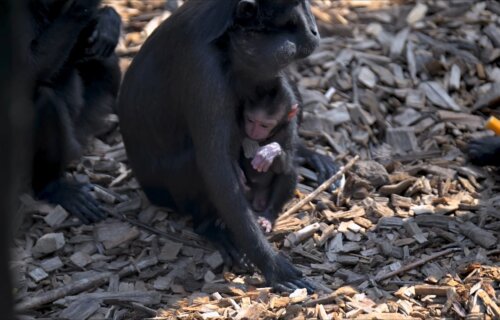CHESTER, United Kingdom — A heartwarming video showcases a rare newborn Sulawesi Crested Macaque monkey engaging in playful interactions and snuggling with its mother. The diminutive monkey, yet to be named, was born to parents Rumple and Masamma on May 16 at the Chester Zoo in the United Kingdom.
The delightful footage illustrates the young monkey nestled against its mother before attempting to climb a branch. The newborn’s gender remains unidentified at this time. In additional scenes, the baby monkey can be seen energetically exploring the enclosure, followed closely by other animals intent on ensuring its safety.
Experts estimate that fewer than 5,000 Sulawesi Crested Macaques still inhabit their natural rainforest habitat on the Indonesian island of Sulawesi. Over the past four decades, their population has dwindled by 80 percent, yet these monkeys can often be observed in the wild in groups of 25 to 30 individuals. Currently, the International Union for Conservation of Nature (IUCN) classifies this species as critically endangered.
Rumple the Sulawesi crested macaque has had a baby! ✨
Look how closely she holds her precious new arrival 🐒 pic.twitter.com/b14nK8Wx1S
— Chester Zoo (@chesterzoo) June 2, 2023
“Every birth is a step forward for the international conservation breeding program that’s working to safeguard the future of this critically endangered species,” says Mark Brayshaw, head of mammals at the zoo, according to a statement from SWNS.
“It also provides an opportunity to learn more about their behavior, biology and social structures, which all helps to inform the efforts to protect the species globally. These charismatic monkeys face a plethora of threats in wild. While illegal logging has seen their forest home disappear around them, they’re also targets for poachers.”
“In their homeland, macaques are considered a local delicacy and are often the food choice for special occasions such as weddings. That’s why our conservationists have provided support to the local communities, while also investigating the main causes of deforestation, which all helps to protect the incredible diversity of animals living on the island of Sulawesi,” Brayshaw continues.
U.K.’s Chester Zoo is celebrating the birth of one of the world’s most endangered primates: a rare Sulawesi crested macaque monkey. pic.twitter.com/zlR1lLwGFA
— The Associated Press (@AP) June 3, 2023
Could your everyday habits be contributing to animal extinction?
A recent study suggests your morning coffee may be wiping out animals in developing nations. Researchers in Australia said that the use of products and services from the food, beverage, and agriculture industries is the “greatest driver” of consumption-driven extinction risks. According to their findings, the three sectors make up 39 percent of the global extinction-risk footprint, followed by consumption of goods and services from the construction sector (16%).
The link between high-income nations and the developing world, where many of these species live, comes down to international trade.
“The finding from this study that about 30 percent of the global extinction-risk footprint is embedded in international trade underlines the need to consider the responsibilities of different countries and all actors, including financing of conservation, not only in the context of their national boundaries but extending to their impacts internationally,” says co-author Dr. Juha Siikamäki, chief economist of the International Union for Conservation of Nature (IUCN).
South West News Service writer Izzy Hawksworth contributed to this report.

